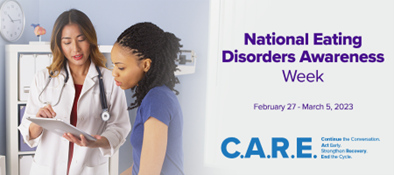February 28, 2023
The Community Health Corner
Submitted by Stephanie Gutierrez

Community health uses science-based approaches for the greatest health benefit to the greatest number of people by addressing the social, economic, and structural drivers that impact everyone’s health. The National Extension Framework for Health Equity and Well-being recommends using community development practices to ensure that every person has the opportunity to "attain his or her full health potential" and no one is "disadvantaged from achieving this potential because of social position or other socially determined circumstances." The following tools and resources can be used to improve health equity and well-being by working with communities to achieve the nation’s Healthy People 2030 objectives.
DISCOVER NOW: Eating disorders, such as anorexia, bulimia, and binge eating disorder, are serious mental health conditions that can happen to anyone but are much more common in women. Our National Eating Disorder Awareness Week (EDAW) began on Monday, February 27, and ends on Sunday, March 5. Visit the Office on Women’s Health website to learn more about these conditions and how to have conversations about them.
USE NOW: The Division of Population Health (DPH) within the National Center for Chronic Disease Prevention and Health Promotion (NCCDPHP) has announced the release of the newly updated Chronic Disease Indicators (CDI) dataset. The CDI website provides access to the most up-to-date, uniformly defined state-level data on a wide range of chronic diseases, conditions, and risk factors that have a substantial impact on public health.
READ NOW: The U.S. Breastfeeding Committee published the 2023 State and Territory Breastfeeding Reports. These expansive reports were developed to educate policymakers and the public on the status of breastfeeding where they live and highlight opportunities to address gaps in breastfeeding support. Developed for each of the 50 states, DC, and four U.S. territories, each report depicts how breastfeeding rates and other policy, environmental and systems-related measures (including paid leave) in that state or territory compared to national rates. The reports list the coalitions serving communities in each state and provide a comprehensive look at the state and community-based lactation projects made possible through federal funding from the Centers for Disease Control and Prevention, Health Resources & Service Administration, Office on Women's Health, and the National Institutes of Health.
For more information, contact Elaine Johannes, ejohanne@ksu.edu, and Stephanie Gutierrez, smgutier@k-state.edu.